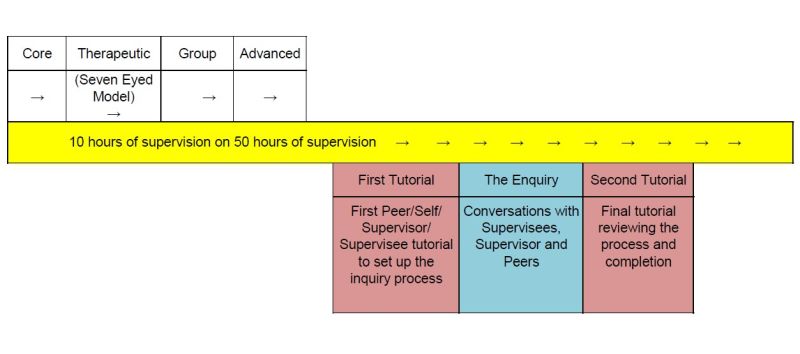We are now offering the opportunity to train face to face in London for the complete programme September 2025 - July 2027.
We have also added online supervision courses for the complete programme starting January 2026 - July 2027.
This is a modular programme which can be taken over a flexible period of time, from a minimum of a year upwards. The process we have embraced is self, peer, supervisor and supervisees assessment. We have found that this keeps the process in relationship and maximises the learning. The reputation of the courses and their history has enabled graduates to use their attendance as a recognised supervision training and they report that our training has qualified them for the work they have wanted to do in the field of supervision. We aim to provide the requirements for professional accreditation as supervisors including those of BACP, UKCP and BPS.
The Certificate consists of four modules, supervision practice and then followed by the self and peer assessment enquiry and tutorials:
Four modules to be attended in this order:
1. Core
This is the first part of the four-stage supervision training. The module will include:
CLEAR model of supervision:
Contracting with particular reference to stakeholders and the wider system
Listening as a supervisor to all levels including to the ‘field’
Exploring with the appropriate balance of participation and reflection
Action including rehearsal of future scenarios
Review including links to a wider context
- Exploration of core beliefs, limiting mindsets and reactive patterns
- Development of the 'internal supervisor'
- Feedback skills
- The supervisory relationship, the working alliance, and the triadic constellation
- Practice sessions with feedback in small groups
- All Core course participants will receive a complimentary copy of 'In Love with Supervision' Shohet R. And Shohet J. 2020
2. Therapeutic - The Seven-Eyed Model
This module is for those who are currently supervising. The module will include:
- Maps and models of the supervision process
- Developmental model of supervision
- Experiential model as described in (2020) Shohet R & Shohet J In Love with supervision; creating transformative conversations
- Opportunities to work in triads, as supervisor, supervisee, and observer
- An exploration of contracting for different types of supervision
- Managing supervision boundaries
3. Group
- Contracting
- Using the resources of the group
- The different facilitator styles in group supervision
- How group dynamics affect group supervision
- Practice sessions with feedback
- Balancing individual, group, and task needs
- Application of the seven eyed model to Group Supervision
4. Advanced/Integration
This is the final part of our training for those who have completed the other modules. The module is run in the form of a learning community. As well as input from the tutors, members take responsibility for their own and each other’s learning.
The module will include:
- Inter-personal process recall training using video
- Advanced skills training
- Developing ethical maturity
- Supervising difficult situations
- Managing assessments
If you have completed our Certificate programme it is possible to repeat a course at a cost of £150 if the course is not fully booked.

Tutorials and Self, Supervisor, Supervisee and Peer Assessment
- Ten hours of Supervision on supervision with a senior practitioner of the participant’s choice covering 50 hours of supervision practice, the 50 hours commencing from the time of the Core. The 50 hours do not have to be completed before attending the Advanced Course.
- Supervisor, supervisee, peer and self assessment process takes place after completion of the above and commences with a first tutorial with a CSTD tutor in which the participant contacts their tutor after they have completed the four modules and 50 hours of supervision to arrange their first tutorial. This tutorial is to review their training and the self assessment questionnaire that they will have filled in on the Advanced training and shared with their ‘home group’. It is also to plan their self, supervisor, supervisee and peer enquiry process including how they will embark on the enquiry conversations they will be having in their supervision sessions using the enquiry form.
- A second tutorial completes the process. The participant will share the learning and experience of the enquiry conversations, review their overall learning and celebrate their journey!
We intend the certificate process to be one of self empowerment in which the participant endorses themselves as a supervisor with the support and challenge of their supervisees, peers, supervisor and tutors.
The enquiry form is for a conversation to be had with your supervisor, two or more supervisees and a peer. It is to be handed out to them ahead of the conversation you will be having and filled into together in your supervision session or with regard to your peer in a conversation you will have arranged with each other. The enquiry form is a stepping stone to having a conversation about your relationship and how it serves you both, your clients and your work.
Self, peer, supervisor and supervisee enquiry form
The questionnaires below are for the use of the trainee for their self assessment and they are filled in and discussed at the end of the Advanced.
